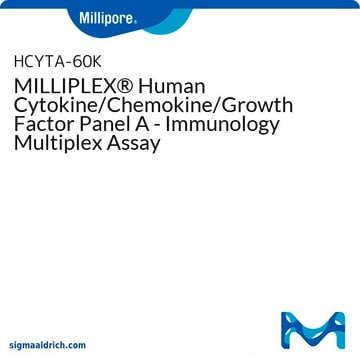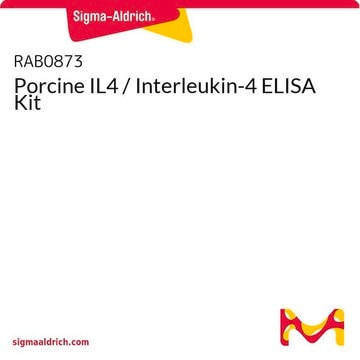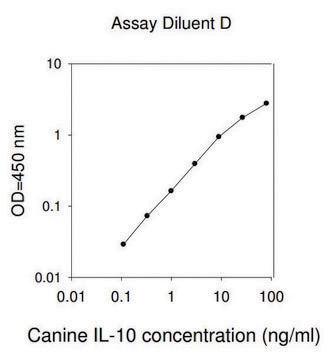CCYTOMAG-90K
MILLIPLEX® Canine Cytokine/Chemokine Magnetic Bead Panel - Immunology Multiplex Assay
Simultaneously analyze multiple cytokine and chemokine biomarkers with Bead-Based Multiplex Assays using the Luminex technology, in mouse serum, plasma and cell culture samples.
Synonym(s):
canine interleukin immunoassay panel, luminex canine cytokine chemokine growth factor multiplex assay, luminex canine pro inflammatory anti inflammatory cytokine panel, millipore canine inflammation multiplex kit
About This Item
Recommended Products
Quality Level
species reactivity
canine
manufacturer/tradename
Milliplex®
assay range
accuracy: 91-109%
sensitivity: 13.6 pg/mL
(IFN-γ)
sensitivity: 21.0 pg/mL
(MCP-1)
sensitivity: 21.7 pg/mL
(IL-8)
sensitivity: 3.2 pg/mL
(IP-10)
sensitivity: 3.5 pg/mL
(IL-2)
sensitivity: 3.7 pg/mL
(IL-6)
sensitivity: 5.3 pg/mL
(KC-like)
sensitivity: 5.8 pg/mL
(IL-18)
sensitivity: 6.1 pg/mL
(TNFα)
sensitivity: 7.5 pg/mL
(IL-7)
sensitivity: 8.5 pg/mL
(IL-10)
sensitivity: 9.0 pg/mL
(IL-15)
sensitivity: 9.2 pg/mL
(GM-CSF)
standard curve range: 12.2-50,000 pg/mL
(All analytes)
technique(s)
multiplexing: suitable
detection method
fluorometric (Luminex xMAP)
shipped in
wet ice
General description
The MILLIPLEX® Canine Cytokine Panel is 13-plex kit to be used for the simultaneous quantification of any or all of the following analytes in canine serum, plasma, tissue/cell lysate and culture supernatant samples: GM-CSF, IFNγ, KC-like, IP-10, IL-2, IL-6, IL-7, IL-8, IL-10, IL-15, IL-18, MCP-1, and TNF-α. This kit uses a 96-well format, contains a lyophilized standard cocktail, two internal assay quality controls and can measure up to 38 samples in duplicate.
The Luminex® xMAP® platform uses a magnetic bead immunoassay format for ideal speed and sensitivity to quantitate multiple analytes simultaneously, dramatically improving productivity while conserving valuable sample volume.
Panel Type: Cytokines/Chemokines
Specificity
Cross-reactivity between the antibodies and any of the other analytes in this panel is non-detectable or negligible.
Application
- Analytes: GM-CSF, IFNγ, IP-10, IL-2, IL-6, IL-7, IL-8, IL-10, IL-15, IL-18, KC-like, MCP-1, and TNF-α.
- Recommended Sample Type: Canine serum, plasma, cell culture supernatant and tissue/cell lysates
- Recommended Sample Dilution: 25 μL of a 1:3 dilution of plasma or serum, or 25 μL cell culture supernatant
- Assay Run Time: Overnight at 4°C or 2 hours at room temperature (20-25° C)
- Research Category: Inflammation & Immunology
Features and Benefits
Packaging
Linkage
Storage and Stability
Other Notes
Legal Information
Disclaimer
Signal Word
Danger
Hazard Statements
Precautionary Statements
Hazard Classifications
Acute Tox. 4 Dermal - Acute Tox. 4 Inhalation - Acute Tox. 4 Oral - Aquatic Chronic 2 - Eye Dam. 1 - Skin Sens. 1 - STOT RE 2
Target Organs
Respiratory Tract
Storage Class Code
10 - Combustible liquids
Certificates of Analysis (COA)
Search for Certificates of Analysis (COA) by entering the products Lot/Batch Number. Lot and Batch Numbers can be found on a product’s label following the words ‘Lot’ or ‘Batch’.
Already Own This Product?
Find documentation for the products that you have recently purchased in the Document Library.
Our team of scientists has experience in all areas of research including Life Science, Material Science, Chemical Synthesis, Chromatography, Analytical and many others.
Contact Technical Service










